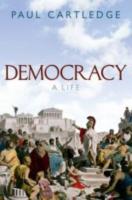
Oxford (2016) h/b 361pp £20 (ISBN 9780199697670)
Professor Cartledge traces the history of democracy from its ancient origins (direct exercise of power by the people) to modern times (representative democracy), noting wide variations in both categories. He has structured the book in the form of a play, complete with prologue and five acts.
Act I provides a review of the sources, both literary and epigraphic. In relation to the 5th/4th century BC notion of δημοκρατία, we are remarkably fortunate. Aristotle’s surviving works include Politics and The constitution of Athens. There are the law court and assembly speeches of Demosthenes, Aeschines and their contemporaries. A selection of Athenian laws and decrees survive. So do some local regulations, including a marble stele of Thoricos recording what sacrifices were required and when.
Act II (which is really the core of this work) guides us through the history of Athenian democracy. In the early sixth century Solon resolved conflicts between the aristocracy, the middle classes and the masses by a redistribution of power. The middle classes were allowed to become archons (top officials) and subsequently members of the Areopagus (a powerful council). The people were given an assembly (Heliaea), which functioned as a court of appeal. In the late sixth century Cleisthenes laid the foundations for what we now know as Athenian democracy. He created the structure of thirty trittyes, ten tribes and the council of 500 (50 men per tribe). The Areopagus retained the right of impeaching high officials. The people gained new powers through their Assembly. They also gained the power of ostracism. No less important, the people gained the power to adjudicate judicially through jury courts. There was a brief interruption in 404-403, when Athens was subject to the ‘Thirty Tyrants’. That raises the interesting question whether Athenian democracy was the same before and after restoration.
Accompanying the narrative history is a review of the theorists, including Herodotus’ account of the ‘Persian debate’, Plato’s logical attack on the concept of democracy and Aristotle’s more nuanced analysis. Aristotle saw oligarchy as rule by the rich and democracy as rule by the poor. He helpfully compiled a manual of the different constitutions prevailing across Greece. This enables Cartledge to provide a broader account of Greek democracies in all their manifestations.
Act III traverses the ‘golden age’ of Greek democracy in the fourth century. It covers Mantinea, Corinth, Phleious, Thebes and Argos. There is a separate chapter on Athens in the age of Lycurgus.
Act IV covers the period from the death of Alexander the Great to the Renaissance in a mere 50 pages. Inevitably, therefore, the narrative gathers pace. Cartledge describes the somewhat confusing decline of democracy during the Hellenistic period. He characterises the middle and late Roman Republic as variants of democracy. But there was this incongruity: the Republic set about extinguishing democracy in the city states which it absorbed into the growing Roman Empire. After that came the Principate, the Dominate and the Byzantine Empire. These vast tracts of world history have little place in any study of democracy. Cartledge disposes of them summarily in a short chapter entitled ‘Democracy denied’. Finally there is a review of Italian city states in the Middle Ages and the emergence of democracy in Renaissance Florence. Along the way Cartledge provides a synopsis of the Magna Carta story and its impact on the history of the United States. The year 2015 has seen a surfeit of books about Magna Carta, not all of the highest quality. It is refreshing to see Magna Carta discussed in the broader context of 2,500 years’ political history.
Act V traces the gradual revival of democracy in more recent times. In England the Putney debates, chaired by Oliver Cromwell, got people thinking and talking about political institutions to serve the whole of society. The inaptly named ‘Glorious Revolution’ of 1688 and a line of political philosophers led progressively to the development of representative democracy in Britain. Cartledge traces the emergence of representative democracy in France after the revolution and in America post-1776. After the inevitable genuflection to de Tocqueville, he identifies the debt which all those jurisdictions owe to Greece as the ultimate source of their inspiration.
Where does all this leave the reader? He/she has a stimulating biography of democracy, both in theory and in all its practical manifestations. The book may be light on detail, except in relation to Greek history and culture (where Professor Cartledge is a renowned expert). In the place of detail, however, there is a coherent overview of the subject as a whole. This book is also a thoughtful response to those scholars, such as Amartya Sen, who argue that democracy is not ‘a quintessentially Western idea’. Cartledge’s analysis suggests that it is just that.
Rupert Jackson
